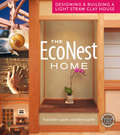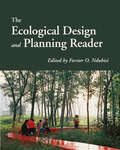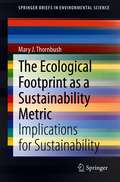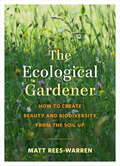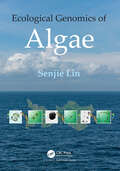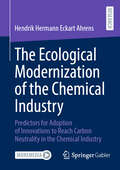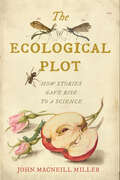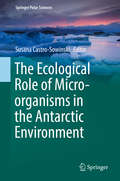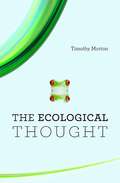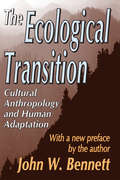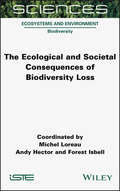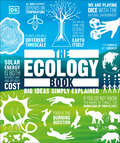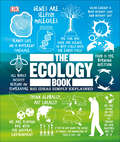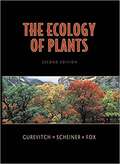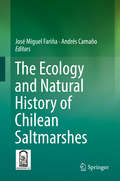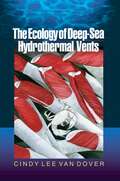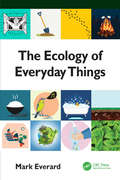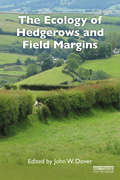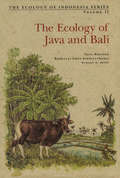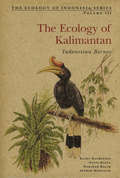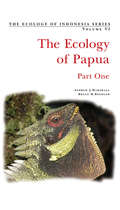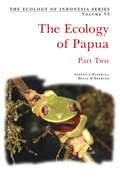- Table View
- List View
The EcoNest Home: Designing & Building a Light Straw Clay House (Mother Earth News Books for Wiser Living)
by Paula Baker-Laporte Robert Laporte“Every aspect of creating a beautiful, sensible, and healthy home is explored and demonstrated with elegance and clarity.” —Martin Hammer, architect, co-director, Builders Without Borders An EcoNest is not just a home—it is a breathtakingly beautiful structure that nurtures health and embraces ecology. This unique approach to construction combines light straw clay, timber framing, earthen floors, natural plasters, and other natural techniques with the principles of Building Biology to create a handcrafted living sanctuary. By bringing together time-honored traditions and modern innovations, owners of EcoNests enjoy living spaces that reflect the best of both worlds.The EcoNest Home is an in-depth exploration of the benefits of choosing this technique over conventional alternatives, combined with a complete practical guide for prospective designers and builders. Authors Paula Baker-Laporte and Robert Laporte draw on their own extensive experience to provide:A detailed explanation of the nature-based science behind EcoNestsFully-illustrated, step-by-step instructions to guide you through constructionDozens of inspiring photos of completed projectsThe most comprehensive, North American resource on light straw clay construction, written by its leading proponents, The EcoNest Home is a must-read for anyone considering building their own healthy, affordable, environmentally friendly, natural home.“A great new book for the ecological designer, builder and homeowner.” —Sukita Ray Crimmel, coauthor of Earthen Floors“The EcoNest Home is made from well designed, sophisticated techniques rooted in simplicity. This book demonstrates the outstanding results that arise to their steadfast commitment to creating healthy, natural homes.” —Adam Weismann and Katy Bryce, authors of Using Natural Finishes
The Ecological Design and Planning Reader
by Forster O. NdubisiFrom Henry David Thoreau to Rachel Carson, writers have long examined the effects of industrialization and its potential to permanently alter the world around them. Today, as we experience rapid global urbanization, pressures on the natural environment to accommodate our daily needs for food, work, shelter, and recreation are greatly intensified. Concerted efforts to balance human use with ecological concerns are needed now more than ever. A rich body of literature on the effect of human actions on the natural environment provides a window into what we now refer to as ecological design and planning. The study and practice of ecological design and planning provide a promising way to manage change in the landscape so that human actions are more in tune with natural processes. In The Ecological Design and Planning Reader Professor Ndubisi offers refreshing insights into key themes that shape the theory and practice of ecological design and planning. He has assembled, synthesized, and framed selected seminal published scholarly works in the field from the past one hundred and fifty years----ranging from Ebenezer Howard's Garden Cities of To-morrow to Anne Whiston Spirn's, "Ecological Urbanism: A Framework for the Design of Resilient Cities. " The reader ends with a hopeful look forward, which suggests an agenda for future research and analysis in ecological design and planning. This is the first volume to bring together classic and contemporary writings on the history, evolution, theory, methods, and exemplary practice of ecological design and planning. The collection provides students, scholars, researchers, and practitioners with a solid foundation for understanding the relationship between human systems and our natural environment.
The Ecological Footprint as a Sustainability Metric: Implications for Sustainability (SpringerBriefs in Environmental Science)
by Mary J. ThornbushThis book examines the Ecological Footprint and biocapacity accounting within an applied development content for Costa Rica. By doing so, it is possible to track changes as well as perhaps link these to overarching global issues, such as trade, globalization, and food security, among other emergent topics based findings stemming from this methodology. Based on a timeseries since 1961, it is possible to track cross-temporal changes of land-type categories (for crop land, grazing land, forest land, fishing ground, built-up land, and carbon) of the Ecological Footprint and biocapacity conveying whether a country is in ecological deficit and what may be contributing to such a trend
The Ecological Gardener: How to Create Beauty and Biodiversity from the Soil Up
by Matt Rees-WarrenDesign a garden for the future—because what we grow matters. "Matt Rees-Warren explains why every square inch of Earth, including our gardens, has ecological significance... Excellent, timely, essential!" —Douglas W. Tallamy, author of Nature’s Best Hope Transform your garden into a self-sustaining haven for nature and wildlife. Ecological garden designer Matt Rees-Warren shares inspirational design ideas and practical projects to help you create a garden that is both beautiful today and sustainable tomorrow. The Ecological Gardener will give you the tools to create an abundant, healthy garden from the soil up—a garden that welcomes birds and bees and allows native planting and wild flowers to flourish, with minimal carbon impact or need for fresh water. This book can guide both novice and experienced gardeners alike in their journey to a more ecological approach, and is full of practical projects and information, including: Finding the right design for your space Creating a wildflower meadow Building rainwater catchments and other tips for water conservation Making compost from kitchen waste, leaf mold, compost tea and more Creating a space for wildlife such as hedgehogs, bees and other pollinators Finding beauty in your garden during the winter Matt will show you how to re-imagine how you garden, working with nature instead of controlling it, to create a space that promotes both wildlife and beauty.
The Ecological Gardener: How to Create Beauty and Biodiversity from the Soil Up
by Matt Rees-WarrenDesign a garden for the future—because what we grow matters."Matt Rees-Warren explains why every square inch of Earth, including our gardens, has ecological significance... Excellent, timely, essential!" —Douglas W. Tallamy, author of Nature&’s Best HopeTransform your garden into a self-sustaining haven for nature and wildlife. Ecological garden designer Matt Rees-Warren shares inspirational design ideas and practical projects to help you create a garden that is both beautiful today and sustainable tomorrow.The Ecological Gardener will give you the tools to create an abundant, healthy garden from the soil up—a garden that welcomes birds and bees and allows native planting and wild flowers to flourish, with minimal carbon impact or need for fresh water. This book can guide both novice and experienced gardeners alike in their journey to a more ecological approach, and is full of practical projects and information, including: • Finding the right design for your space• Creating a wildflower meadow• Building rainwater catchments and other tips for water conservation• Making compost from kitchen waste, leaf mold, compost tea and more• Creating a space for wildlife such as hedgehogs, bees and other pollinators• Finding beauty in your garden during the winterMatt will show you how to re-imagine how you garden, working with nature instead of controlling it, to create a space that promotes both wildlife and beauty.
The Ecological Genomics of Algae
by Senjie LinDiscover the captivating world of algae through the lens of genomics in Ecological Genomics of Algae. This comprehensive resource explores the evolutionary, ecological, and molecular foundations of algal biology. Spanning 21 chapters, it delves into genome evolution, environmental adaptation, energy acquisition, nutrient uptake, environmental sensing and signal transduction, stress responses, defense, and algae-microbe interactions. From unicellular forms to complex seaweeds, this book illuminates how algae navigate their environments and adapt to climate change. Ideal for researchers and students, it provides cutting-edge insights into the genomic mechanisms driving one of nature's most versatile and essential groups of organisms.
The Ecological Modernization of the Chemical Industry: Predictors for Adoption of Innovations to Reach Carbon Neutrality in the Chemical Industry
by Hendrik Hermann AhrensIn this book key predictors of renewable feedstock adoption to achieve carbon neutrality in the European chemical industry are explored. Systematic data collection for the analysis was conducted through semi-structured expert interviews and document analysis, validating existing theories, including agent-based models of innovation diffusion, the multi-level perspective of socio-technical transition and technological innovation systems. The research findings led to insights on the key predictors of renewable resource adoption and support practitioners to manage the transition to carbon neutrality.
The Ecological Plot: How Stories Gave Rise to a Science (Under the Sign of Nature)
by John MacNeill MillerUnraveling the surprising history of the concept of ecologyThe Ecological Plot traces the roots of this most mainstream branch of science back to an unexpected source: narrative storytelling. Weaving together the histories of different disciplines, John MacNeill Miller shows how pioneering thinkers drew on a shared set of literary techniques to imagine how different species could work together as a single, interdependent community, redefining the way we conceptualize the natural world. Beginning with a series of revolutionary exchanges between the political economist Thomas Robert Malthus, the writer Harriet Martineau, and the naturalist Charles Darwin, The Ecological Plot identifies the foundations of modern notions of ecology, economics, and realist fiction, maps how they evolved through the works of Victorian writers such as Elizabeth Gaskell, George Eliot, and Thomas Hardy, and shows how they resurfaced in the works of Aldo Leopold and Rachel Carson a century later. Miller&’s book reveals why our most sophisticated efforts to explain humanity&’s relationship to nature have been segregated into different disciplines and makes an argument for the importance of bringing these separate ways of understanding the world back together as a crucial step toward solving the environmental, economic, and ethical problems of the present.
The Ecological Role of Micro-organisms in the Antarctic Environment (Springer Polar Sciences)
by Susana Castro-SowinskiThis book provides up-to-date multidisciplinary information regarding microbial physiological groups in terms of their role in the Antarctic ecology. How do microorganisms shape the Antarctic environment? The book presents a thorough overview of the most important physiological microbial groups or microbial systems that shape the Antarctic environment. Each microbial model is described in terms of their physiology and metabolism, and their role in the Antarctic environmental sustainability. The individual chapters prepare readers for understanding the relevance of the microbial models from both an historical perspective, and considering the latest developments. This book will appeal to researchers and teachers interested in the Antarctic science, but also to students who want to understand the role of microbes in the ecology of extreme environments.
The Ecological Thought
by Timothy MortonIn this passionate, lucid, and surprising book, Timothy Morton argues that all forms of life are connected in a vast, entangling mesh. This interconnectedness penetrates all dimensions of life. No being, construct, or object can exist independently from the ecological entanglement, Morton contends, nor does “Nature” exist as an entity separate from the uglier or more synthetic elements of life. Realizing this interconnectedness is what Morton calls the ecological thought.<P> In three concise chapters, Morton investigates the profound philosophical, political, and aesthetic implications of the fact that all life forms are interconnected. As a work of environmental philosophy and theory, The Ecological Thought explores an emerging awareness of ecological reality in an age of global warming. Using Darwin and contemporary discoveries in life sciences as root texts, Morton describes a mesh of deeply interconnected life forms—intimate, strange, and lacking fixed identity.<P> A “prequel” to his Ecology without Nature: Rethinking Environmental Aesthetics (Harvard, 2007), The Ecological Thought is an engaged and accessible work that will challenge the thinking of readers in disciplines ranging from critical theory to Romanticism to cultural geography.
The Ecological Transition: Cultural Anthropology and Human Adaptation
by John W. BennettWritten during the height of the ecology movement, The Ecological Transition is a stunning interdisciplinary work. It combines anthropology, ecology, and sociology to formulate an understanding of cultural-environmental relationships. While anthropologists have been studying relationships between humans and the physical environment for a very long time, only in the last thirty years have questions inherent in these relationships broadened beyond description and classification. For example, the concept of environment has been extended beyond the physical into the social.Although anthropologists have adopted many of the concepts that Bennett develops in the book, he also feels that the central issues have never been addressed, either by anthropologists or by people in related disciplines. The most important of these, in Bennett's opinion, is the failure to incorporate a respect for the environmental in contemporary culture, which would allow making exceptions in certain human practices in order to protect the environment. His point in The Ecological Transition is that a basic cultural change in modern civilization is necessary to achieve this end.Both a theoretical and a practical work, The Ecological Transition emphasizes the relationships between human culture, the physical environment, technology, and social policy. The Ecological Transition is a challenging volume that makes us face the consequences of human behavior in the modern world: its effect on pollution, natural resources, agriculture, the economy, and population, to name just a few areas. The book remains a significant contribution to the discourse on social, economic, and environmental problems. While the book was first published in 1976, it still reads as a contemporary tract.
The Ecological and Societal Consequences of Biodiversity Loss
by Michel Loreau Andy Hector Forest IsbellThe idea that changes in biodiversity can impact how ecosystems function has, over the last quarter century, gone from being a controversial notion to an accepted part of science and policy. As the field matures, it is high time to review progress, explore the links between this new research area and fundamental ecological concepts, and look ahead to the implementation of this knowledge.This book is designed to both provide an up-to-date overview of research in the area and to serve as a useful textbook for those studying the relationship between biodiversity and the functioning, stability and services of ecosystems. The Ecological and Societal Consequences of Biodiversity Loss is aimed at a wide audience of upper undergraduate students, postgraduate students, and academic and research staff.
The Ecology Book (DK Big Ideas)
by DKLearn about species, environments, ecosystems and biodiversity in The Ecology Book.Part of the fascinating Big Ideas series, this book tackles tricky topics and themes in a simple and easy to follow format. Learn about Ecology in this overview guide to the subject, great for novices looking to find out more and experts wishing to refresh their knowledge alike! The Ecology Book brings a fresh and vibrant take on the topic through eye-catching graphics and diagrams to immerse yourself in. This captivating book will broaden your understanding of Ecology, with:- More than 90 of the greatest ideas in ecology- Packed with facts, charts, timelines and graphs to help explain core concepts- A visual approach to big subjects with striking illustrations and graphics throughout- Easy to follow text makes topics accessible for people at any level of understandingThe Ecology Book is a captivating introduction to what’s happening on our planet with the environment and climate change, aimed at adults with an interest in the subject and students wanting to gain more of an overview. Here you’ll discover more than 90 of the greatest ideas when it comes to understanding the living world and how it works, through exciting text and bold graphics.Your Ecological Questions, Simply ExplainedHow do species interact with each other and their environment? How do ecosystems change? What is biodiversity and can we afford to damage it? This fresh new guide looks at our influence on the planet as it grows, and answers these profound questions. If you thought it was difficult to learn about this field of science, The Ecology Book presents the information in a clear layout. Learn the key theories, movements, and events in biology, geology, geography, and environmentalism from the ideas of classical thinkers in this comprehensive guide.The Big Ideas SeriesWith millions of copies sold worldwide, The Ecology Book is part of the award-winning Big Ideas series from DK. The series uses striking graphics along with engaging writing, making big topics easy to understand.
The Ecology Book: Big Ideas Simply Explained (DK Big Ideas)
by DKLearn about species, environments, ecosystems and biodiversity in The Ecology Book.Part of the fascinating Big Ideas series, this book tackles tricky topics and themes in a simple and easy to follow format. Learn about Ecology in this overview guide to the subject, great for novices looking to find out more and experts wishing to refresh their knowledge alike! The Ecology Book brings a fresh and vibrant take on the topic through eye-catching graphics and diagrams to immerse yourself in. This captivating book will broaden your understanding of Ecology, with:- More than 90 of the greatest ideas in ecology- Packed with facts, charts, timelines and graphs to help explain core concepts- A visual approach to big subjects with striking illustrations and graphics throughout- Easy to follow text makes topics accessible for people at any level of understandingThe Ecology Book is a captivating introduction to what&’s happening on our planet with the environment and climate change, aimed at adults with an interest in the subject and students wanting to gain more of an overview. Here you&’ll discover more than 90 of the greatest ideas when it comes to understanding the living world and how it works, through exciting text and bold graphics.Your Ecological Questions, Simply ExplainedHow do species interact with each other and their environment? How do ecosystems change? What is biodiversity and can we afford to damage it? This fresh new guide looks at our influence on the planet as it grows, and answers these profound questions. If you thought it was difficult to learn about this field of science, The Ecology Book presents the information in a clear layout. Learn the key theories, movements, and events in biology, geology, geography, and environmentalism from the ideas of classical thinkers in this comprehensive guide.The Big Ideas SeriesWith millions of copies sold worldwide, The Ecology Book is part of the award-winning Big Ideas series from DK. The series uses striking graphics along with engaging writing, making big topics easy to understand.
The Ecology Of Plants
by Gordon A. Fox Jessica GurevitchNow in full color, this thoroughly revised and updated second edition of The Ecology of Plants incorporates many new illustrations and hundreds of new references. The text covers a range of topics that you might find in a general ecology textbook, but with the focus on the interactions between plants and their environment over a range of scales. Some of the subjects covered are unique to plants, such as photosynthesis and the ecology of plant--soil interactions; other topics, such as resource and mate acquisition, emphasize the distinctive ways plants (in contrast to mobile animals) deal with their environments. The book is unusual in emphasizing the importance of evolutionary and other historical processes for current ecology. Throughout the text, human environmental influences are discussed. While the book is written for an undergraduate college course in plant ecology, the engaging style, thorough coverage of the field, and contemporary perspective make it accessible and useful to others as well, from graduate students in conservation biology to evolutionary biologists and resource managers.
The Ecology and Natural History of Chilean Saltmarshes
by José Miguel Fariña Andrés CamañoThis book consolidates the information, results, experience and perspectives of different research groups working on Chilean Saltmarshes. Some aspects of these ecosystems such as their bio-geographical connectivity, flora and faunal components, the interaction between ecosystem components and especially the response of this kind of ecosystems to human and natural perturbations defines the Chilean Saltmarshes as an attractive systems for future studies, focused into test the theoretical and experimental aspects of saltmarshes and general ecology.
The Ecology of Commerce: A Declaration of Sustainability
by Paul HawkenA visionary new program that businesses can follow to help restore the planet.
The Ecology of Deep-Sea Hydrothermal Vents
by Cindy Lee Van DoverTeeming with weird and wonderful life--giant clams and mussels, tubeworms, "eyeless" shrimp, and bacteria that survive on sulfur--deep-sea hot-water springs are found along rifts where sea-floor spreading occurs. The theory of plate tectonics predicted the existence of these hydrothermal vents, but they were discovered only in 1977. Since then the sites have attracted teams of scientists seeking to understand how life can thrive in what would seem to be intolerable or extreme conditions of temperature and fluid chemistry. Some suspect that these vents even hold the key to understanding the very origins of life. Here a leading expert provides the first authoritative and comprehensive account of this research in a book intended for students, professionals, and general readers. Cindy Lee Van Dover, an ecologist, brings nearly two decades of experience and a lively writing style to the text, which is further enhanced by two hundred illustrations, including photographs of vent communities taken in situ. The book begins by explaining what is known about hydrothermal systems in terms of their deep-sea environment and their geological and chemical makeup. The coverage of microbial ecology includes a chapter on symbiosis. Symbiotic relationships are further developed in a section on physiological ecology, which includes discussions of adaptations to sulfide, thermal tolerances, and sensory adaptations. Separate chapters are devoted to trophic relationships and reproductive ecology. A chapter on community dynamics reveals what has been learned about the ways in which vent communities become established and why they persist, while a chapter on evolution and biogeography examines patterns of species diversity and evolutionary relationships within chemosynthetic ecosystems. Cognate communities such as seeps and whale skeletons come under scrutiny for their ability to support microbial and invertebrate communities that are ecologically and evolutionarily related to hydrothermal faunas. The book concludes by exploring the possibility that life originated at hydrothermal vents, a hypothesis that has had tremendous impact on our ideas about the potential for life on other planets or planetary bodies in our solar system.
The Ecology of Everyday Things
by Mark EverardNature is all around us, in the beautiful but also in the unappealing and functional, and from the awe-inspiring to the mundane. It is vital that we learn to see the agency of the natural world in all things that make our lives possible, comfortable and profitable. The Ecology of Everyday Things pulls back the veil of our familiarity on a range of ‘everyday things’ that surround us, and which we perhaps take too much for granted. This key into the magic world of the everyday can enable us to take better account of our common natural inheritance. Professor James Longhurst, Assistant Vice Chancellor, University of the West of England (UWE Bristol) For many people, ecosystems may be a remote concept, yet we eat, drink, breathe and interface with them in every moment of our lives. In this engaging textbook, ecosystems scientist Dr. Mark Everard considers a diversity of ‘everyday things’, including fascinating facts about their ecological origins: from the tea we drink, to the things we wear, read and enjoy, to the ecology of communities and space flight, and the important roles played by germs and ‘unappealing creatures’ such as slugs and wasps. In today’s society, we are so umbilically connected to ecosystems that we fail to notice them, and this oversight blinds us to the unsustainability of everyday life and the industries and policy environment that supports it. The Ecology of Everyday Things takes the reader on an enlightening, fascinating voyage of discovery, all the while soundly rooted in robust science. It will stimulate awareness about how connected we all are to the natural world and its processes, and how important it is to learn to better treat our environment. Ideal for use in undergraduate- and school-level teaching, it will also interest, educate, engage and enthuse a wide range of less technical audiences.
The Ecology of Hedgerows and Field Margins
by John W. DoverHedges and field margins are important wildlife habitats and deliver a range of ecosystem services, and their value is increasingly recognised by ecologists. This book reviews and assesses the current state of research on hedgerows and associated field margins. With the intensification of agriculture in the second half of the last century, field sizes were increased by amalgamation and the rooting out of hedges, synthetic pesticide and inorganic fertiliser use increased, and traditional methods of hedge management were largely abandoned. The book is split into two main sections. The first deals with definitions, current and historic management, the impact of pesticides, the decline in hedge stock and condition, and new approaches to hedge evaluation using remote sensing techniques. The second section explores the pollination and biological pest control benefits provided by hedges and field margins and examines the ecology of some of the major groups that are found in hedgerows and field margins: butterflies and moths, carabid beetles, mammals, and birds. A case study on birds and invertebrates from a research farm managed as a commercial enterprise, but which attempts to farm with wildlife in mind, brings these themes together. A final chapter introduces the neglected area of hedges in the urban environment. The book will be of great interest to advanced students, researchers and professionals in ecology, agriculture, wildlife conservation, natural history, landscape, environmental and land management.
The Ecology of Java and Bali
by Roehayat Emon Soeriaatmadja Suraya A. Afiff Tony WhittenThe Ecology of Java and Bali distills for the first time the information found in nearly 3,000 scholarly works relevant to an understanding of the full range of natural and man-made ecosystems on these islands--many of them available only in Dutch, German or Indonesian. It also contains the results of original research, interviews and personal experience. It will be useful to resource managers, ecologists and government planners, as well as to all others interested in the region.Java and Bali are the best known of all the islands in the Indonesian archipelago. Nowhere else in the country are ecological issues of such importance, and nowhere else is there a better chance of the major development problems being solved. This is because Java has the greatest concentration of development projects, the densest population, excellent human resources, and the interest of many of the most powerful decision makers. Bali, meanwhile, has the eyes of the world on it as an important tourist destination enjoyed by both domestic and foreign visitors.
The Ecology of Kalimantan
by Arthur Mangalik Kathy Mackinnon Hakimah Halim Gusti HattaThis Iong-awaited book distills for the first time the information found in many thousands of scholarly documents relevant to an understanding of the full range of natural and man-made ecosystems on the island--many of them available up to now only in Dutch, German or Indonesian. This book presents a complete summary of our current scientific knowledge about Borneo including the rainforest and riverine habitats that are endangered by logging and industrial development, along with a discussion of land use patterns and current problems.Kalimantan is the Indonesian portion of the huge island of Borneo. Kalimantan has played a key role in Indonesia's economic development and is a major earner of foreign revenue due to the island's rich natural resources: forests, oil, gas, coal, and other minerals. In this book the authors argue that Kalimantan can be developed, but within tight ecological constraints and with great care. This book remains a standard reference for scientists, anthropologists, writers, and anyone interested in the region.
The Ecology of Kalimantan
by Arthur Mangalik Kathy Mackinnon Hakimah Halim Gusti HattaThis Iong-awaited book distills for the first time the information found in many thousands of scholarly documents relevant to an understanding of the full range of natural and man-made ecosystems on the island--many of them available up to now only in Dutch, German or Indonesian. This book presents a complete summary of our current scientific knowledge about Borneo including the rainforest and riverine habitats that are endangered by logging and industrial development, along with a discussion of land use patterns and current problems.Kalimantan is the Indonesian portion of the huge island of Borneo. Kalimantan has played a key role in Indonesia's economic development and is a major earner of foreign revenue due to the island's rich natural resources: forests, oil, gas, coal, and other minerals. In this book the authors argue that Kalimantan can be developed, but within tight ecological constraints and with great care. This book remains a standard reference for scientists, anthropologists, writers, and anyone interested in the region.
The Ecology of Papua: Part One
by Bruce M. Beehler Andrew J. MarshallThe Ecology of Papua brings together 76 authors to catalog for the first time the many facets of Papua's environment. Designed for students of conservation, environmental workers, and academic researchers, it is a richly detailed text, dense with biogeographical data, historical reference, and fresh insight on this complicated and marvelous region. We hope it will serve to raise awareness of Papua on a global as well as local scale, and to catalyze effective conservation of its most precious natural assets.New Guinea is the largest and highest tropical island, and one of the last great wilderness areas remaining on Earth. Papua is noteworthy for its equatorial glaciers, its vast forested floodplains, its imposing central mountain range, its Raja Ampat Archipelago, and its several hundred traditional forest-dwelling societies. Papua remains inadequately studied and largely pristine. One of the wildest places left in the world, Papua possesses extraordinary biological and cultural diversity. Today, Papua's environment is under threat from growing outside pressures to exploit its expansive forests and to develop large plantations of oil palm and biofuels. It is important that Papua's leadership balance economic development with good resource management, to ensure the long-term well-being of its culturally diverse populace.
The Ecology of Papua: Part Two
by Bruce M. Beehler Andrew J. MarshallThe Ecology of Papua brings together 76 authors to catalog for the first time the many facets of Papua's environment. Designed for students of conservation, environmental workers, and academic researchers, it is a richly detailed text, dense with biogeographical data, historical reference, and fresh insight on this complicated and marvelous region. We hope it will serve to raise awareness of Papua on a global as well as local scale, and to catalyze effective conservation of its most precious natural assets.New Guinea is the largest and highest tropical island, and one of the last great wilderness areas remaining on Earth. Papua is noteworthy for its equatorial glaciers, its vast forested floodplains, its imposing central mountain range, its Raja Ampat Archipelago, and its several hundred traditional forest-dwelling societies. Papua remains inadequately studied and largely pristine. One of the wildest places left in the world, Papua possesses extraordinary biological and cultural diversity. Today, Papua's environment is under threat from growing outside pressures to exploit its expansive forests and to develop large plantations of oil palm and biofuels. It is important that Papua's leadership balance economic development with good resource management, to ensure the long-term well-being of its culturally diverse populace.
